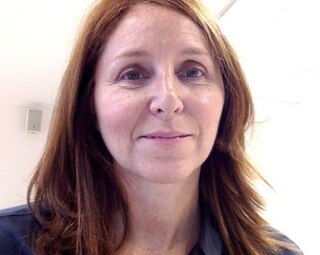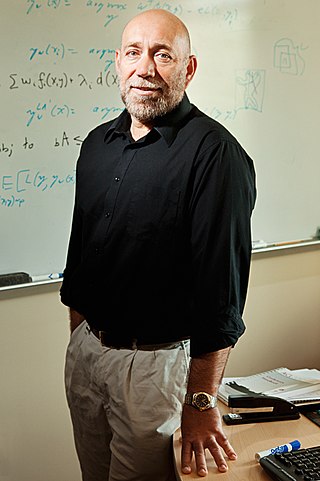
The Association for the Advancement of Artificial Intelligence (AAAI) is an international scientific society devoted to promote research in, and responsible use of, artificial intelligence. AAAI also aims to increase public understanding of artificial intelligence (AI), improve the teaching and training of AI practitioners, and provide guidance for research planners and funders concerning the importance and potential of current AI developments and future directions.
Bart Selman is a Dutch-American professor of computer science at Cornell University. He has previously worked at AT&T Bell Laboratories. He is also co-founder and principal investigator of the Center for Human-Compatible Artificial Intelligence (CHAI) at the University of California, Berkeley, led by Berkeley artificial intelligence (AI) expert Stuart J. Russell, and co-chair of the Computing Community Consortium's 20-year roadmap for AI research.
Alan Mackworth is a professor emeritus in the Department of Computer Science at the University of British Columbia. He is known as "The Founding Father" of RoboCup. He is a former president of the Association for the Advancement of Artificial Intelligence (AAAI) and former Canada Research Chair in Artificial Intelligence from 2001–2014.
Hector Joseph Levesque is a Canadian academic and researcher in artificial intelligence. His research concerns incorporating commonsense reasoning in intelligent systems and he initiated the Winograd Schemas Challenge.
James Frederick Allen is a computational linguist recognized for his contributions to temporal logic, in particular Allen's interval algebra. He is interested in knowledge representation, commonsense reasoning, and natural language understanding, believing that "deep language understanding can only currently be achieved by significant hand-engineering of semantically-rich formalisms coupled with statistical preferences". He is the John H. Dessaurer Professor of Computer Science at the University of Rochester

Manuela Maria Veloso is the Head of J.P. Morgan AI Research & Herbert A. Simon University Professor Emeritus in the School of Computer Science at Carnegie Mellon University, where she was previously Head of the Machine Learning Department. She served as president of Association for the Advancement of Artificial Intelligence (AAAI) until 2014, and the co-founder and a Past President of the RoboCup Federation. She is a fellow of AAAI, Institute of Electrical and Electronics Engineers (IEEE), American Association for the Advancement of Science (AAAS), and Association for Computing Machinery (ACM). She is an international expert in artificial intelligence and robotics.

Sarit Kraus is a professor of computer science at the Bar-Ilan University in Israel. She was named the 2020-2021 ACM Athena Lecturer recognising her contributions to artificial intelligence, notably to multiagent systems, human-agent interaction, autonomous agents and nonmonotonic reasoning, in addition to exemplary service and leadership in these fields.

Eric Joel Horvitz is an American computer scientist, and Technical Fellow at Microsoft, where he serves as the company's first Chief Scientific Officer. He was previously the director of Microsoft Research Labs, including research centers in Redmond, WA, Cambridge, MA, New York, NY, Montreal, Canada, Cambridge, UK, and Bangalore, India.
Dragomir R. Radev was an American computer scientist who was a professor at Yale University, working on natural language processing and information retrieval. He also served as a University of Michigan computer science professor and Columbia University computer science adjunct professor, as well as a Member of the Advisory Board of Lawyaw.

Milind Tambe is an Indian-American educator serving as a Professor of Computer Science at Harvard University. He also serves as the director of the Center for Research on Computation and Society at Harvard University and the director of "AI for Social Good" at Google Research India.
Henry A. Kautz is a computer scientist, Founding Director of Institute for Data Science and Professor at University of Rochester. He is interested in knowledge representation, artificial intelligence, data science and pervasive computing.

Francesca Rossi is an Italian computer scientist, currently working at the IBM Thomas J. Watson Research Center as an IBM Fellow and the IBM AI Ethics Global Leader.

Martha Elizabeth Pollack is an American computer scientist who has served as the 14th president of Cornell University since April 2017. Previously, she served as the 14th provost and executive vice president for academic affairs of the University of Michigan from 2013 to 2017.

Dan Roth is the Eduardo D. Glandt Distinguished Professor of Computer and Information Science at the University of Pennsylvania.
Lillian Lee is a computer scientist whose research involves natural language processing, sentiment analysis, and computational social science. She is a professor of computer science and information science at Cornell University, and co-editor-in-chief of the journal Transactions of the Association for Computational Linguistics.
Bonnie Jean Dorr is an American computer scientist specializing in natural language processing, machine translation, automatic summarization, social computing, and explainable artificial intelligence. She is a professor and director of the Natural Language Processing Research Laboratory in the Department of Computer & Information Science & Engineering at the University of Florida. Gainesville, Florida She is professor emerita of computer science and linguistics and former dean at the University of Maryland, College Park, former associate director at the Florida Institute for Human and Machine Cognition,, and former president of the Association for Computational Linguistics.
Bonnie Lynn Nash-Webber is a computational linguist. She is an honorary professor of intelligent systems in the Institute for Language, Cognition and Computation (ILCC) at the University of Edinburgh.
David C. Parkes is a British-American computer scientist. He is the George F. Colony Professor of Computer Science and Co Faculty Director of the Harvard Data Science Initiative. From 2013–17, he was Area Dean for Computer Science. Parkes is a Fellow of the Association for the Advancement of Artificial Intelligence (AAAI) and the Association for Computing Machinery (ACM).
Ellen Riloff is an American computer scientist currently serving as a professor at the School of Computing at the University of Utah. Her research focuses on Natural Language Processing and Computational Linguistics, specifically information extraction, sentiment analysis, semantic class induction, and bootstrapping methods that learn from unannotated texts.

Thomas L. Dean is an American computer scientist known for his work in robot planning, probabilistic graphical models, and computational neuroscience. He was one of the first to introduce ideas from operations research and control theory to artificial intelligence. In particular, he introduced the idea of the anytime algorithm and was the first to apply the factored Markov decision process to robotics. He has authored several influential textbooks on artificial intelligence.









